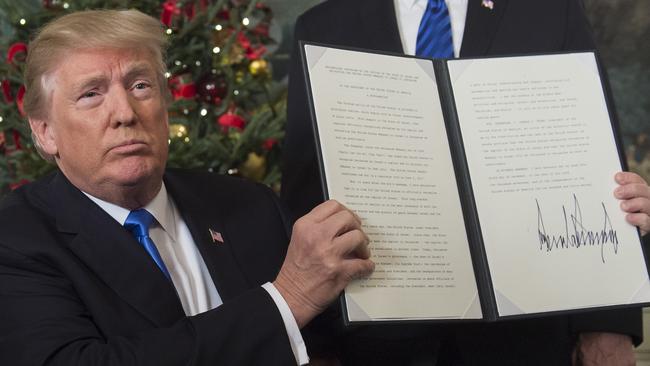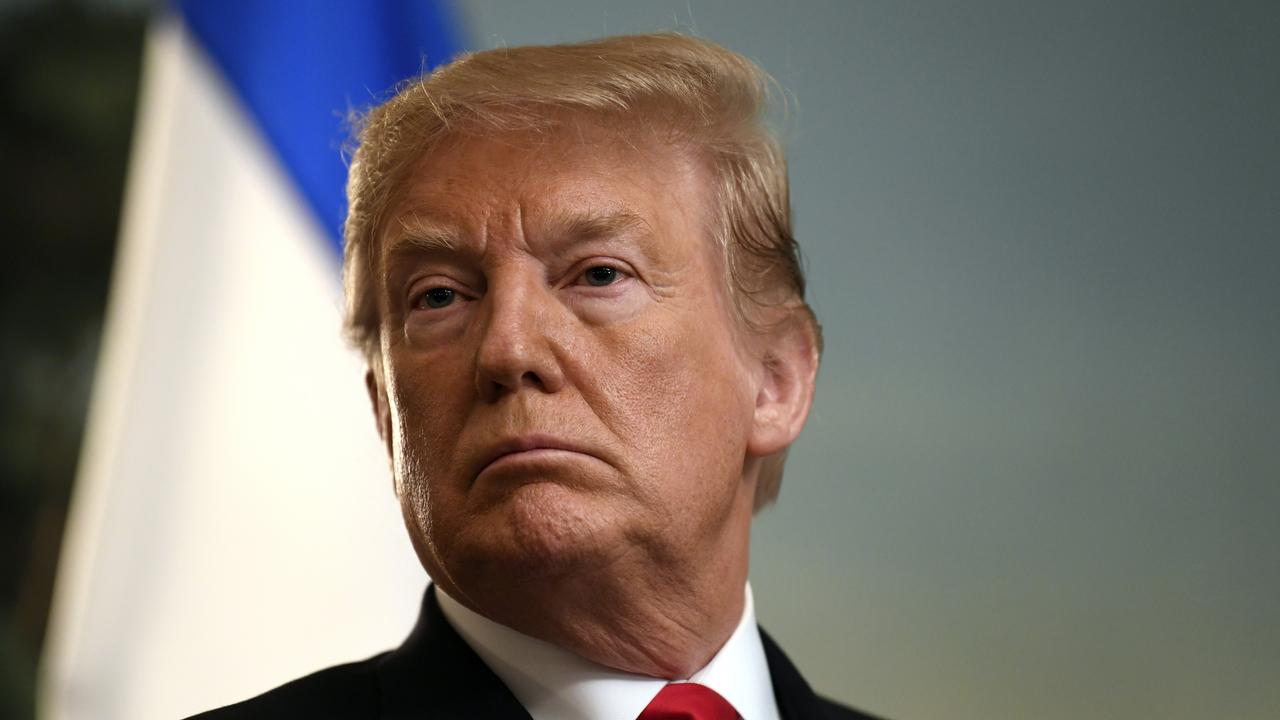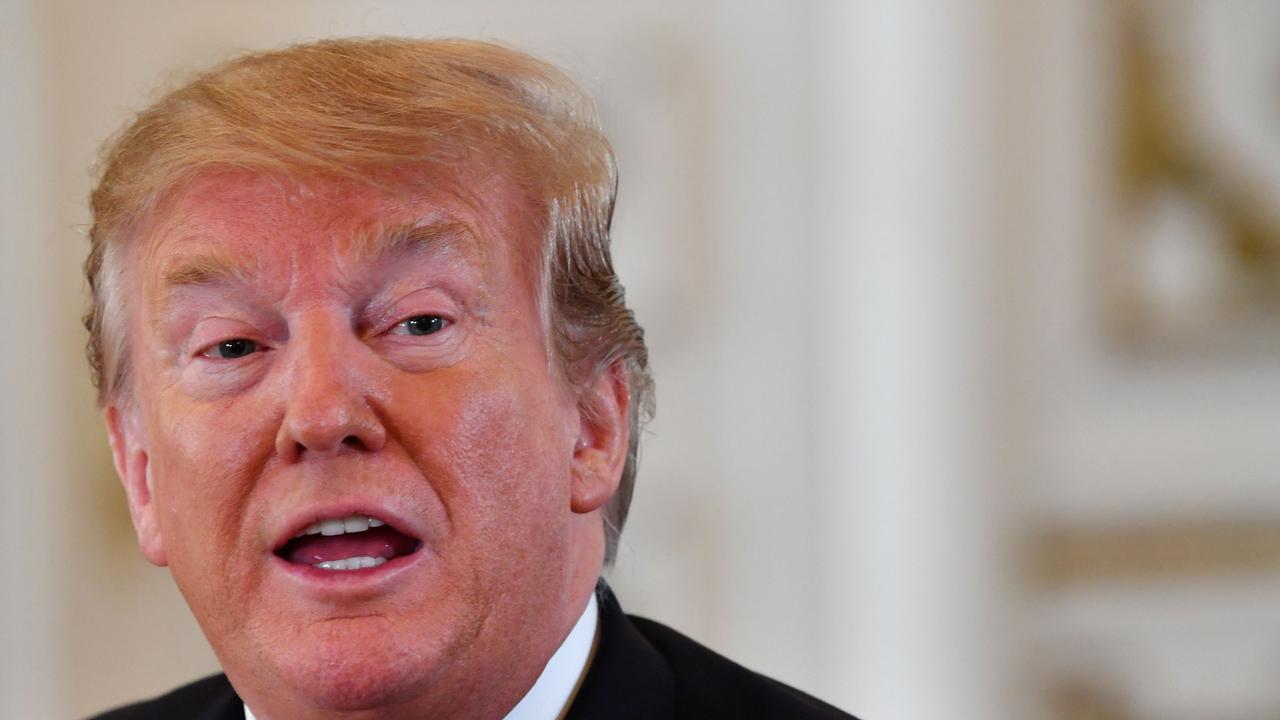Donald Trump: US recognises Jerusalem as Israel capital
Middle East leaders slam Donald Trump’s decision to recognise Jerusalem as capital of Israel, Palestians warn of ‘day of rage’.

US embassies in the Middle East and Europe are warning Americans travelling or living there of the potential for violent protests after Donald Trump’s decision to recognise Jerusalem as the capital of Israel. Within minutes of Mr Trump’s announcement, the embassies in Turkey, Jordan, Germany and Britain issued security alerts urging Americans to exercise vigilance and caution.
Foreign Minister Julie Bishop said the government was reviewing its travel advice to the Middle East in the wake of the move. Ms Bishop said she was taking advice on the tensions in Israel and the broader region, flagging travel advice may change.
Soon after Mr Trump’s announcement, hundreds of angry Palestinians took to the streets, chanting anti-Trump slogans and burning car tyres. Protests were seen in Beit Hanoun in the northern Gaza Strip, all over Gaza City and in the southern Gaza Strip towns of Khan Younis and Rafah.
Smaller protests also took place in the West Bank communities of Ramallah and Bethlehem. Mosque loudspeakers called on Gaza residents to take to the streets to express rage and protest against TMr rump’s declaration.
“Jerusalem is the capital of the state of Palestine,” he said Hassan Sami Dbabesh, a 20-year-old construction worker from Gaza city. “Who is Trump to intervene into Muslims’ affairs and declare that Jerusalem is the capital of the state of Israel, which is not recognised by the Arabs and the Muslims?”
Leaders from the Muslim world and wider international community immediately condemned the move, which overturns nearly 70 years of US policy in the region.
Palestinian leader Mahmoud Abbas said Mr Trump had destroyed his credibility as a Mideast peace broker. In a televised statement, Mr Abbas said the decision “is a declaration of withdrawal from the role it has played in the peace process.”
By recognising Israel’s claim to Jerusalem, Mr Trump is seen by the Palestinians as siding with Israel on the most sensitive issue in the conflict and Palestinians warned of “a days of rage” over the announcement.
Hamas condemned the move, declaring that Mr Trump had opened “the gates of hell,” and
Turkey described the move as “irresponsible” and illegal.
Announcing his decision, Mr Trump described the move as an obvious and overdue recognition of reality.
But he said the decision, which has sparked anger across the Middle East and among Palestinians, would not diminish America’s push for a peace agreement between Israel and Palestine.
“I have determined that it is time to officially recognise Jerusalem as the capital of Israel,” Mr Trump declared today. “This is a long overdue step to advance the peace process and to work towards a lasting agreement.”
Mr Trump said the move was “nothing more or less than the recognition of reality,” noting that the country’s prime minister, parliament and highest courts were all based in Jerusalem.
But he said America’s recognition of Jerusalem and its plan to move the US embassy there from Tel Aviv was an isolated issue. He said the decision makes no assumption about the ultimate status and the final boundaries of Jerusalem in any peace agreement concluded between Israel and the Palestinians.
Mr Trump acknowledged that the decision would be unpopular with some, but said the US would continue to push for a possible peace agreement in the region andmaintained that his decision would not compromise the city’s geographic and political borders, which will still be determined by Israel and the Palestinians.
“The United States remains deeply committed to helping facilitate a peace agreement that is acceptable to both sides. I intend to do everything in my power to forge such an agreement.”
Israeli PM Benjamin Netanyahu hailed the announcement as “historic,” but pledged no change to status quo at Jerusalem holy sites. “Israel will always ensure freedom of worship for Jews Christians and Muslims alike,” he said.
Ahead of Mr Trump’s speech, Arab and Muslim leaders had spoken about the potential for violence. In Gaza, hundreds of Palestinian protesters burned American and Israeli flags. They also waved Palestinian flags and banners proclaiming Jerusalem as their “eternal capital,” language that Israelis similarly use for their nation.
Egypt denounced the decision as a violation of international resolutions on the city’s status.
A Foreign Ministry statement said Egypt is worried about the impact of the US move on the stability of the region and about its “extremely negative” impact on the Israeli-Palestinian peace process.
Saudi media reported that King Salman told Mr Trump by telephone: “Any declaration on the status of Jerusalem before reaching a final settlement would harm the peace negotiation process and escalate tension in the region.”
The Arab League called it “a dangerous measure that would have repercussions” across the region, and also questioned the future role of the US as a “trusted mediator” in peace talks.
The supreme leader of Iran, Ayatollah Ali Khamenei, said: “It is out of despair and debility that they want to declare Jerusalem as capital of the Zionist regime. On the issue of Palestine, their hands are tied and they can’t achieve their goals.”
Even America’s closest allies in Europe questioned the wisdom of Trump’s radical departure from the past US position, which was studiously neutral over the sovereignty of the city.
French president Emmanuel Macron described Mr Trump’s decision as “regrettable,” but called for efforts to “avoid violence at all costs.”
Ms Bishop told ABC radio: “We are considering whether we should change our travel advice, we are monitoring the situation very carefully, we are getting feedback from our embassy in Tel Aviv in the region.”
“I am deeply concerned at the level of unrest now, the fault lines between Turkey and the Kurds, between the Sunnis and the Shia, between the Saudis and Iranians.
“I am concerned about the level of tension now and of course would not support any action that would add to that.”
Ms Bishop said Australia would not follow the US President’s lead and identify the contested city of Jerusalem as the capital of Israel or move its embassy from Tel Aviv to Jerusalem.
“The political identification of the status of Jerusalem is a matter for final status negotiations, that has always been our position, it has been a longstanding position from both sides of the Australian parliament,” Ms Bishop said.
America’s consulate in Jerusalem has ordered US personnel and their families to avoid visiting Jerusalem’s Old City or the West Bank, and urged American citizens in general to avoid places with increased police or military presence.
Cameron Stewart is also US Contributor for Sky News Australia
With agencies



